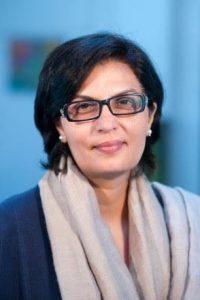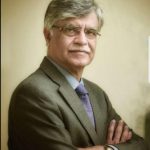Opinion: Who should lead WHO (pt 2 of 3)? Why I support Pakistan’s “Great Reformer”
The views expressed in this blog post belong solely to its author and do not necessarily reflect the views of PLOS or the PLOS journals. Please note, this is the second of three posts on the May 2017 election of the next Director General of the World Health Organization. Read part 1 here. Proposed guest posts for “Your Say” can be emailed to blogs@plos.org — PLOSBLOGS
By Fareed A. Minhas
Eleanor Roosevelt once said that “A woman is like a tea bag; you never know how strong it is until it’s in hot water.” This dictum fits well for Dr. Sania Nishtar, with her proven leadership skills. In two months, world leaders will come together in Geneva to decide who is the best candidate to lead the organisation through choppy waters and Nishtar is one of the three nominees.
Since the much-critiqued Ebola outbreak response, the agency has come under particular scrutiny from member states, who are all too aware of the rising risk of disease outbreaks, as well as an explosion of noncommunicable diseases (NCDs) across the world.
NCDs in the developing world
Tackling health challenges in Pakistan is difficult, complicated and demands the strongest of leaders with the utmost patience and negotiating skills. It was back in 2003, when Dr. Sania Nishtar was leading the national plan on noncommunicable diseases, a that we first met. As the Director of the WHO Collaborating Center for Mental Health, I was intrigued to meet the first female cardiologist in Pakistan’s history, who I’d heard so much about even though I was a little pessimistic about our chances of making much progress.

I suspected that being a physician, she would be calm under pressure. However, I have to admit now that I completely under-estimated just how expertly Sania would drive the effort. Sania is clear on how to approach problems in a systematic and structured way, following a checklist similar to how she operates on heart attack victims.
To develop the National Action Plan on non-communicable disease prevention, control and health promotion in Pakistan (the first integrated NCD plan in the developing world), Sania assembled all the key experts from Pakistan around one table. Although many were curious, shall we say, by her comparatively young age; Sania is adept at developing trust and buy-in. By carefully listening and respecting all stakeholders, especially the older members of the group, Sania slowly brought individuals and groups onto the same page.
Despite mental health being a huge taboo at the time, Sania had a vision for integrating mental health and NCDs; conceptualising what that would look like practically, listening to challenges and working collaboratively through problems. Like with everything Sania puts her mind to, she succeeded with flying colours and then unified the government and other stakeholders behind the plan so that it could be jointly rolled out. Many pioneers of psychiatry have not been able to achieve and contribute to field the way she has done being a non-mental health professional. The plan on NCDs was recognized in the 2005 World Chronic Disease Report as a great model of public-private partnership
The legacy of joint NCD programme planning lives on today and the experience provided an empirical basis for enhancing the performance of the health system by fostering partnerships within integrated evidence-based models and permitted an analysis of health systems models built on shared responsibility for the purpose of providing sustainable health outcomes.
Addressing ‘choked pipes’ in health care delivery
It’s not just national impact, Sania’s work has impacted the how the world views health systems. The publication of Choked Pipes in 2010 provided a blueprint for how Pakistan and other low- and middle-income countries can move faster towards universal health coverage in mixed health systems. I have first-hand experience of the downside of the public health system and have seen millions suffer due to these “choked pipes”. Sania’s book formulated my unexpressed feelings into words and served to dispel my frustrations.
Sania relishes challenges, and I still think what she accomplished in government was borderline impossible. On joining the caretaker government in 2013, and holding several large portfolios, Sania quickly got to work reestablishing the Federal Ministry of Health. Diseases don’t respect borders and Sania was clear that Pakistan must return to having a federal health ministry so that it could respond nationally to disease outbreaks and exercise other functions, which central institutions are responsible for in federal systems. What should have taken many months, if not years, Sania accomplished in less than 100 days.
This remarkable reform has led to Pakistan making progress in the health sector. Sania has broken down silos and worked through cultural challenges to push the health for all agenda forward. As a further testament to her commitment to accountability and good governance, Sania published a 136-page Handover Paper thoroughly outlining her experience and key decision points. I have never seen this level of transparency and it would be a huge asset to the WHO, which is too often shrouded in secrecy.
From government, Sania has continued to lead the charge both domestically and internationally, perhaps most impressively by scaling up an innovative financing facility in Pakistan, serving on Gavi’s board and chairing the WHO’s Commission on Ending Childhood Obesity. The latter highlighted her skills again of bringing all stakeholders to the same table and driving a difficult agenda forward with governments, international agencies, civil society and the private sector.
The current scale of the global health challenges should not be underestimated but I have no doubt that Sania would hit the ground running and accelerate the WHO agenda so that it’s reputation is restored and more importantly, it’s truly fit for purpose. Sania, is backed by the Organization of Islamic Cooperation and is the visionary reformer WHO needs. I urge all member states to support her candidacy.
 Professor Fareed Minhas is the Head of the Institute of Psychiatry at the Rawalpindi General Hospital and the Director of the WHO Collaborating Centre for Mental Health Research, Training and Substance Abuse in Pakistan. He has been the lead investigator on numerous clinical trials and research projects, and has published extensively in the field of mental health research.
Professor Fareed Minhas is the Head of the Institute of Psychiatry at the Rawalpindi General Hospital and the Director of the WHO Collaborating Centre for Mental Health Research, Training and Substance Abuse in Pakistan. He has been the lead investigator on numerous clinical trials and research projects, and has published extensively in the field of mental health research.

[…] Source: Opinion: Who should lead WHO (pt 2 of 3)? Why I support Pakistan’s “Great Reformer” […]
Knowing her for good 20 years now … I know she is an extraordinary woman with a track record of making things possible with low cost high impact solutions and with absolute professionalism and honesty. WHO would see things rolling out and rolling out quickly in the direction it needs to …. She is an inspiration for us all
[…] For statements in support of the other two final candidates, read part 1 and part 2. […]